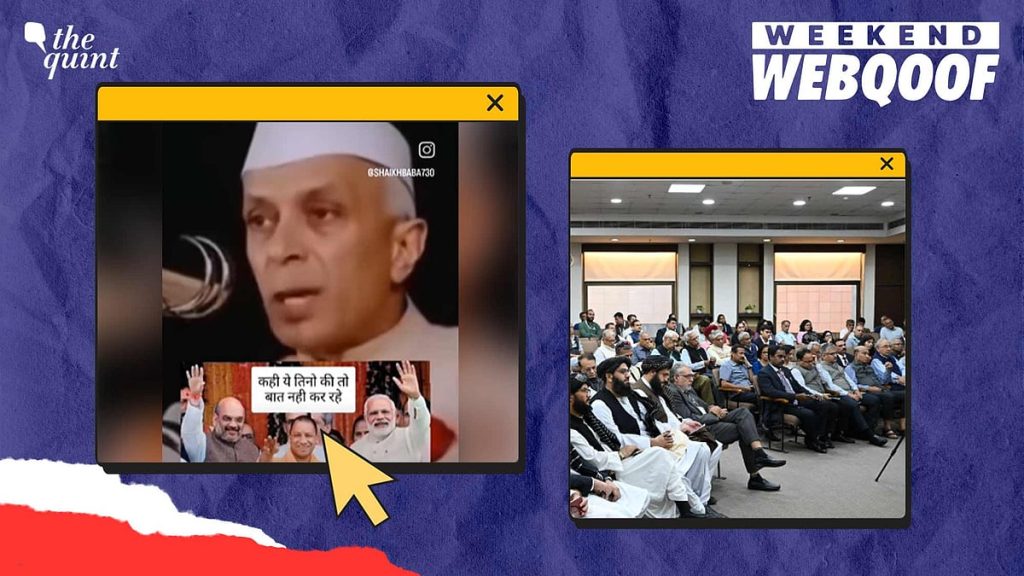Listen to the article
Fact Check: Netherlands Did Not Issue Special RSS Centenary Stamps Despite BJP Claims
A viral claim circulating on social media suggesting that the Netherlands government issued commemorative stamps to mark 100 years of the Rashtriya Swayamsevak Sangh (RSS) has been debunked as false.
The claim gained significant traction after being shared by several high-profile accounts, including official handles of the Bharatiya Janata Party (BJP), the party’s IT cell head Amit Malviya, and even Madhya Pradesh Deputy Chief Minister Rajendra Shukla. Images purporting to show these “special stamps” were widely distributed across various social media platforms.
The misinformation reached mainstream media when Times Now, a prominent Indian news channel, aired the claim during one of its broadcasts, further amplifying the unverified information to a nationwide audience.
However, upon verification, no credible evidence supports the assertion that the Dutch government has released any stamps commemorating the RSS centenary. The RSS, founded in 1925, is a right-wing Hindu nationalist organization that serves as the ideological parent of India’s ruling BJP party.
This incident highlights the growing concern around misinformation being shared by political figures and organizations with substantial followings. The BJP, as India’s ruling party, has millions of followers across its various social media accounts, meaning false claims can reach enormous audiences within hours.
The Netherlands and India maintain diplomatic relations dating back to the 1940s, with cooperation in various sectors including trade, technology, and cultural exchanges. However, there is no precedent for the Dutch government issuing commemorative stamps for foreign organizations, particularly those with political affiliations.
International postal commemorations typically honor significant global events, historical milestones, or figures of international importance. National postal authorities maintain strict guidelines regarding the subjects featured on official stamps, making it highly unusual for a foreign political or social organization to be featured without substantial diplomatic significance.
The creation and circulation of fabricated postal stamps is not unprecedented in the digital age. Custom stamps or digitally altered images can be easily created and shared online, often becoming viral before fact-checking efforts can address their authenticity.
This incident occurs amid India’s heightened political climate as the country approaches its general election cycle, where the BJP under Prime Minister Narendra Modi is seeking a third consecutive term. Political analysts note that such claims may be intended to bolster the international credibility of organizations affiliated with ruling parties.
Media literacy experts emphasize the importance of verifying information before sharing, especially when it involves claims about international recognition or validation. They recommend checking official sources, such as the postal authority websites of the countries in question, before accepting such claims at face value.
The Dutch Embassy in India has not issued any statement regarding these purported stamps as of reporting time, but postal authorities in the Netherlands maintain a public record of all officially issued stamps that does not include any RSS commemorative edition.
This is not the first instance where false claims about international recognition have spread in Indian political circles. Similar incidents have occurred in the past, including fabricated endorsements from global leaders and organizations that were later debunked.
Fact-checking organizations continue to play a crucial role in identifying and correcting such misinformation, particularly when it originates from influential political figures who can significantly impact public perception.
Fact Checker
Verify the accuracy of this article using The Disinformation Commission analysis and real-time sources.




8 Comments
This incident underscores the need for greater media literacy and critical thinking when consuming information online. Blindly sharing unverified claims, even from prominent sources, can contribute to the spread of misinformation.
Absolutely. Developing the skills to identify and resist the temptation to amplify unsubstantiated claims is crucial in the digital age, where information can spread rapidly.
The spread of this unsubstantiated claim through social media and mainstream media channels is concerning. Fact-checking and responsible reporting are crucial to counter the spread of misinformation.
Agreed. Misinformation can quickly gain traction and become widely believed, even if it’s demonstrably false. Maintaining journalistic integrity is paramount to prevent the normalization of unverified claims.
The debunking of this false claim about Dutch RSS stamps is a good reminder that official sources and fact-checkers should be the primary go-to for verifying information, rather than relying on social media or partisan news outlets.
This false claim about Dutch RSS stamps highlights the need for vigilance against misinformation, especially around sensitive political and nationalist topics. It’s important to verify information from credible sources before sharing.
While the RSS is an influential organization, making unverified claims about government actions related to it is problematic. Careful examination of evidence is needed to separate fact from fiction, especially on sensitive political topics.
This case highlights the importance of responsible journalism and the need for media outlets to thoroughly vet information before reporting it as fact. Fact-checking and due diligence are essential to prevent the spread of misinformation.